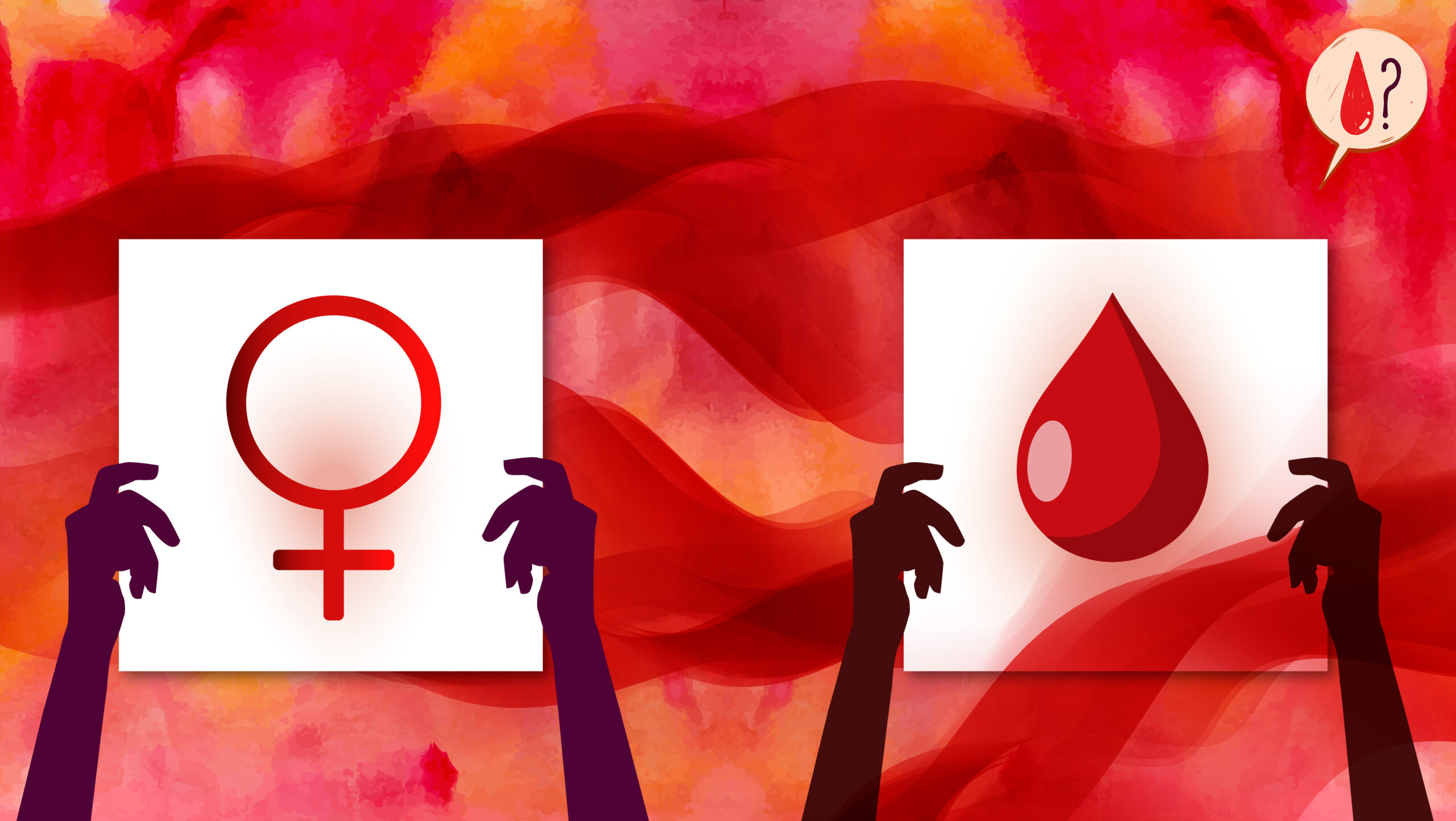This story is part of Seeing Red, a month-long series exploring periods from an LGBTQ2 perspective.
Every month or so, I get the same text from my friend Marian*: “I’m on my period again and I blame you.” I always make sure to reply with some suitably penitent emojis, because, in a sense, she’s right. Marian and I are both trans women, and if I hadn’t opened my big mouth, Marian might never have considered that she was having a period in the first place.
Three years ago, I wrote an article for The Establishment about the poorly understood phenomenon of trans women who experience symptoms akin to Premenstrual Syndrome while on Hormone Replacement Therapy (HRT). In a dozen interviews with transfeminine people, I repeatedly heard stories of nausea, stomach and pelvic cramps, bloating, volatile mood swings and other symptoms consistent with PMS, which occurred on an ongoing, semi-monthly basis (often beginning around six months after the start of treatment). These experiences suggest something physically similar to a menstrual cycle, without the actual bleeding of a period.
The article has since become my most widely read work, and even now I still get the occasional DM from someone wanting to add their own story to the pile of anecdotal data. It’s not hard to see why. Although the body of available research on various forms of HRT is slowly growing, information like this is still hard to come by. Trans people often rely on this anecdotal evidence to provide context for their own lived experiences; though the information gathered is hardly conclusive, it at least points us in a useful direction and helps us to adapt.
But sharing this knowledge comes with a sizeable backlash. I’ve received vociferous castigation, even before the article was published, from trans-exclusionary radical feminists (or TERFs, though not all are truly “radicals”) who were outraged at the mere idea that such a phenomenon could actually manifest in people without a uterus. Since its publication, the article has been the subject of much derision from the same sectors. YouTuber Laci Green called it “pseudoscience run amok.” And the story was the subject of mockery and hate on a noxious forum much like 8chan, and by “gender-critical” cis women on Kiwi Farms, an online community that specializes in harassment and stalking.
In their eyes, my article was an example of “female erasure.” Reports like mine, which complicate what constitutes a period and who experiences them, are apparently stealth attempts to oppress cisgender women. And as large organizations like Planned Parenthood move to adopt gender-neutral language in discussing things like the intricacies of periods and menstruation, those attempts have been met with escalating anger. Terms like “menstruators” or “people who have periods,” for instance, are now being used by health providers to better include non-binary people and trans men who need their services. But some still view this as an attack on cis women and their bodies.
They aren’t shy about sharing that view, either. In January, the Menstrual Health Hub (MH Hub), an advocacy and consulting nonprofit registered in Germany, tweeted an image of a uterus with a line of text that had crossed out the word “women” and replaced it with “people,” so that it read “Why Do People Menstruate?” They were deluged with complaints accusing the organization of attempting to erase women.
The next day MH Hub tweeted an apology. The same thing happened a couple of days later when Women’s March London used the word “menstruators” in a tweet and was beset by outrage. They were then forced to issue a statement clarifying their intent to create a “safe space for all women.” This proved insufficient; some users even accused the account’s manager of manually deleting their tweeted replies to the statement (which, for the record, is not possible).
Trans-exclusionary feminists are so fixated on trans women as their enemy that they steadfastly ignore why linguistic constructions like “menstruators” and “menstruating people” have gained traction in menstrual health conversations over the past two decades: they make room for the specific experiences of transmasculine and non-binary people with vaginas, while sensitively excluding trans women and cis women who, for various reasons, don’t menstruate. Responses that boil down to “well, trans men are still ‘female-bodied’” delegitimize those identities by insisting on referring to anatomy through implicitly gendered constructions of biological sex. When TERFs say “only females menstruate,” they’re using a linguistic dodge to avoid talking about the realities of transmasculine life while staying on-message by making trans women the enemy.
And, contrary to reactionary discourse that characterizes “menstruators” as a recent word invented by oversensitive trans activists, this language has existed in academia and activism for more than 20 years. In her 2010 book, New Blood: Third Wave Feminism and the Politics of Menstruation, Chris Bobel, president of the University of Massachusetts’ Society for Menstrual Cycle Research, writes that “menstruator” in its current form arises from the third-wave “radical menstruation activists” of the 1990s, especially those with roots in DIY and punk communities. The term has been used by feminist artists such as Petra Mattheis and youth activists like those who make up Philadelphia’s Student Environmental Action Coalition, which founded the Tampaction Campaign in 1999. According to Bobel, the use of “menstruator” helped them “uncouple the gendered body from menstruation.” In their ethos, writes Bobel, “menstruation is neither a gift nor a curse; it is a bodily process understood as the object of corporate colonization, and it is time to take it back.”
When you strip off all those misleading narratives and close-enough terminology, it’s easy to see why the linguistics around “women’s health” — including that very phrase — have been subject to such scrutiny and change. Calling folks who menstruate “menstruating people” (or the inverse) is beneficial because it allows us to narrow our focus to only the people who are affected by the issue we’re trying to address. It’s inaccurate to claim that all women have a shared (oppressed) biological experience — that’s a falsehood that many marginalized feminists have fought against for years. “The idea of ‘common oppression,’” notes feminist scholar bell hooks in Feminist Theory: From Margin to Center, is “a false and corrupt platform disguising and mystifying the true nature of women’s varied and complex social reality.” Women’s experiences are simply not uniform, especially when it comes to menstruation and reproduction. Besides postmenopausal women, there are cis women born infertile, those who have had hysterectomies, intersex women and those who were born without vaginas altogether.
When we reevaluate these classifications — of gender, of sex, of biology and anatomy — it makes it easier to direct care and attention, and to identify problems before they become crises. In my original article, I mentioned that some of the symptoms reported were associated with endometriosis, and encouraged people with uteruses to be on the lookout. But I never considered the possibility of a transfeminine person experiencing endometriosis, and yet there’s a small pool of evidence in the literature to suggest such a phenomenon could be possible.
Naming our specific health concerns opens up greater opportunities for everyone to access appropriate care; when we rely on reductive, gendered labelling, we only shut down opportunities to talk candidly about our individual needs. There will always be some people who are too invested in policing the definition and bounds of gender, but we all lose when we let them define our language for us.
*Name has been changed.

This story is part of Seeing Red, a month-long series exploring periods from an LGBTQ2 perspective.


 Why you can trust Xtra
Why you can trust Xtra


